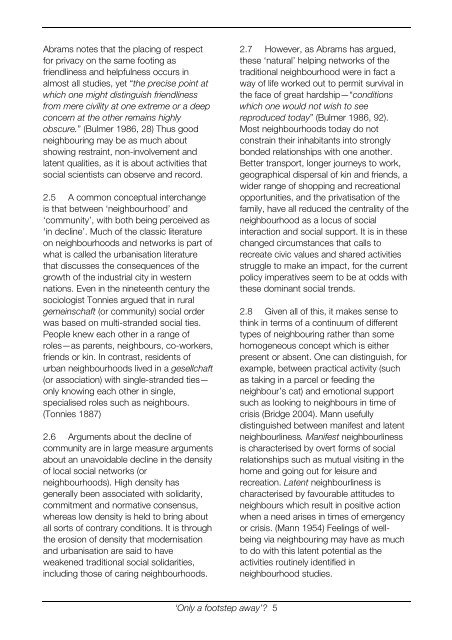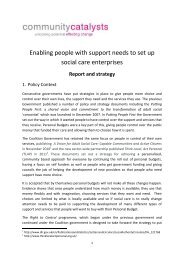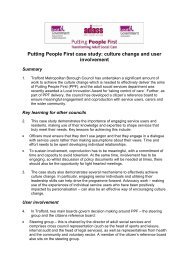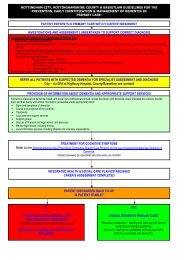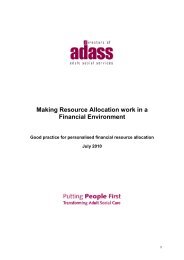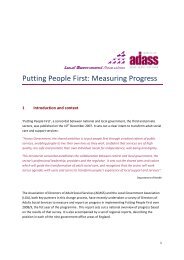'Only a footstep away' - Skills for Care - Think Local Act Personal
'Only a footstep away' - Skills for Care - Think Local Act Personal
'Only a footstep away' - Skills for Care - Think Local Act Personal
- No tags were found...
Create successful ePaper yourself
Turn your PDF publications into a flip-book with our unique Google optimized e-Paper software.
Abrams notes that the placing of respect<strong>for</strong> privacy on the same footing asfriendliness and helpfulness occurs inalmost all studies, yet “the precise point atwhich one might distinguish friendlinessfrom mere civility at one extreme or a deepconcern at the other remains highlyobscure.” (Bulmer 1986, 28) Thus goodneighbouring may be as much aboutshowing restraint, non-involvement andlatent qualities, as it is about activities thatsocial scientists can observe and record.2.5 A common conceptual interchangeis that between ‘neighbourhood’ and‘community’, with both being perceived as‘in decline’. Much of the classic literatureon neighbourhoods and networks is part ofwhat is called the urbanisation literaturethat discusses the consequences of thegrowth of the industrial city in westernnations. Even in the nineteenth century thesociologist Tonnies argued that in ruralgemeinschaft (or community) social orderwas based on multi-stranded social ties.People knew each other in a range ofroles—as parents, neighbours, co-workers,friends or kin. In contrast, residents ofurban neighbourhoods lived in a gesellchaft(or association) with single-stranded ties—only knowing each other in single,specialised roles such as neighbours.(Tonnies 1887)2.6 Arguments about the decline ofcommunity are in large measure argumentsabout an unavoidable decline in the densityof local social networks (orneighbourhoods). High density hasgenerally been associated with solidarity,commitment and normative consensus,whereas low density is held to bring aboutall sorts of contrary conditions. It is throughthe erosion of density that modernisationand urbanisation are said to haveweakened traditional social solidarities,including those of caring neighbourhoods.2.7 However, as Abrams has argued,these ‘natural’ helping networks of thetraditional neighbourhood were in fact away of life worked out to permit survival inthe face of great hardship—“conditionswhich one would not wish to seereproduced today” (Bulmer 1986, 92).Most neighbourhoods today do notconstrain their inhabitants into stronglybonded relationships with one another.Better transport, longer journeys to work,geographical dispersal of kin and friends, awider range of shopping and recreationalopportunities, and the privatisation of thefamily, have all reduced the centrality of theneighbourhood as a locus of socialinteraction and social support. It is in thesechanged circumstances that calls torecreate civic values and shared activitiesstruggle to make an impact, <strong>for</strong> the currentpolicy imperatives seem to be at odds withthese dominant social trends.2.8 Given all of this, it makes sense tothink in terms of a continuum of differenttypes of neighbouring rather than somehomogeneous concept which is eitherpresent or absent. One can distinguish, <strong>for</strong>example, between practical activity (suchas taking in a parcel or feeding theneighbour’s cat) and emotional supportsuch as looking to neighbours in time ofcrisis (Bridge 2004). Mann usefullydistinguished between manifest and latentneighbourliness. Manifest neighbourlinessis characterised by overt <strong>for</strong>ms of socialrelationships such as mutual visiting in thehome and going out <strong>for</strong> leisure andrecreation. Latent neighbourliness ischaracterised by favourable attitudes toneighbours which result in positive actionwhen a need arises in times of emergencyor crisis. (Mann 1954) Feelings of wellbeingvia neighbouring may have as muchto do with this latent potential as theactivities routinely identified inneighbourhood studies.‘Only a <strong>footstep</strong> away’? 5


